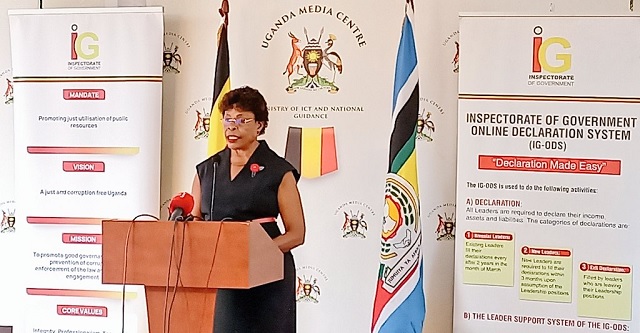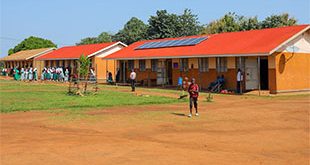
Kampala, Uganda | THE INDEPENDENT | The Inspector General of Government (IGG), Beti Olive Kamya Turwomwe, has announced that all politicians in Uganda must declare their wealth and assets in March 2025. The mandatory exercise will run from March 1 to March 31.
Speaking at a press briefing in Kampala, Kamya urged all politicians to fully comply with the legal requirement conducted every two years. “The Leadership Code Act, Cap 33, requires specified leaders to declare their income, assets, and liabilities to the Inspectorate of Government every two years in March. Chapter 14 of the Constitution and the Leadership Code Act mandate the Inspectorate of Government and the Leadership Code Tribunal to enforce the Leadership Code of Conduct,” she emphasized.
This year’s exercise, themed “Enhanced Accountability Through Wealth Disclosure,” requires all designated leaders to declare their income, assets, and liabilities. Kamya clarified that this obligation applies strictly to leaders, while public officers who are not categorized as leaders will make their declarations in April 2026. “The leaders expected to submit their declarations in March 2025 are listed under the second and third schedules of the Leadership Code Act, Part A and B, including political leaders and specified officers,” she noted.
She emphasized that leaders must declare not only their income and assets but also any liabilities they have incurred or guaranteed. All declarations will be submitted digitally through the Inspectorate of Government Online Declaration System (IG-ODS). “To successfully submit a declaration, leaders must provide their email addresses and mobile phone numbers, which are essential for safeguarding their information,” she added.
Kamya warned against any omissions or misrepresentations in the declarations, stressing that failure to comply constitutes a breach of the law. “Violations of the Leadership Code related to declarations include failure to submit, late submission, non-disclosure of income, assets, or liabilities, making false declarations, and anticipatory declarations,” she explained. The Penal Code Act prescribes sanctions for non-compliance, ranging from fines, warnings, and demotions to dismissal from office and confiscation of illicitly acquired assets.
The IGG also revealed that compliance rates have steadily improved, rising from 85% in 2017 to 90% in 2023, with a target of 95% for the 2025 declaration period. She noted that leaders who failed to submit declarations in 2023 faced prosecution before the Leadership Code Tribunal, with several penalized.
Reaffirming the government’s commitment to fighting corruption, Kamya encouraged the media to promote compliance and urged the public to report suspected cases of leaders accumulating wealth beyond their known income.
She assured leaders facing technical challenges that the Inspectorate of Government offers multiple support channels and advised them to use personal emails for registration instead of institutional emails, which may be blocked by firewalls during bulk email transmissions.
****
URN
 The Independent Uganda: You get the Truth we Pay the Price
The Independent Uganda: You get the Truth we Pay the Price



